Why you can trust Tom's Hardware
Comparison Products
We tested the SK Hynix Gold S31 against the most popular SSDs in this segment. We include the Adata XPG SX8200 Pro and Intel SSD 660p as two mainstream NVMe contenders. We also included a bunch of SATA competitors, including the Crucial MX500, Samsung 860 EVO and QVO, and WD Blue 3D. Finally, we threw in a WD Black HDD for good measure.
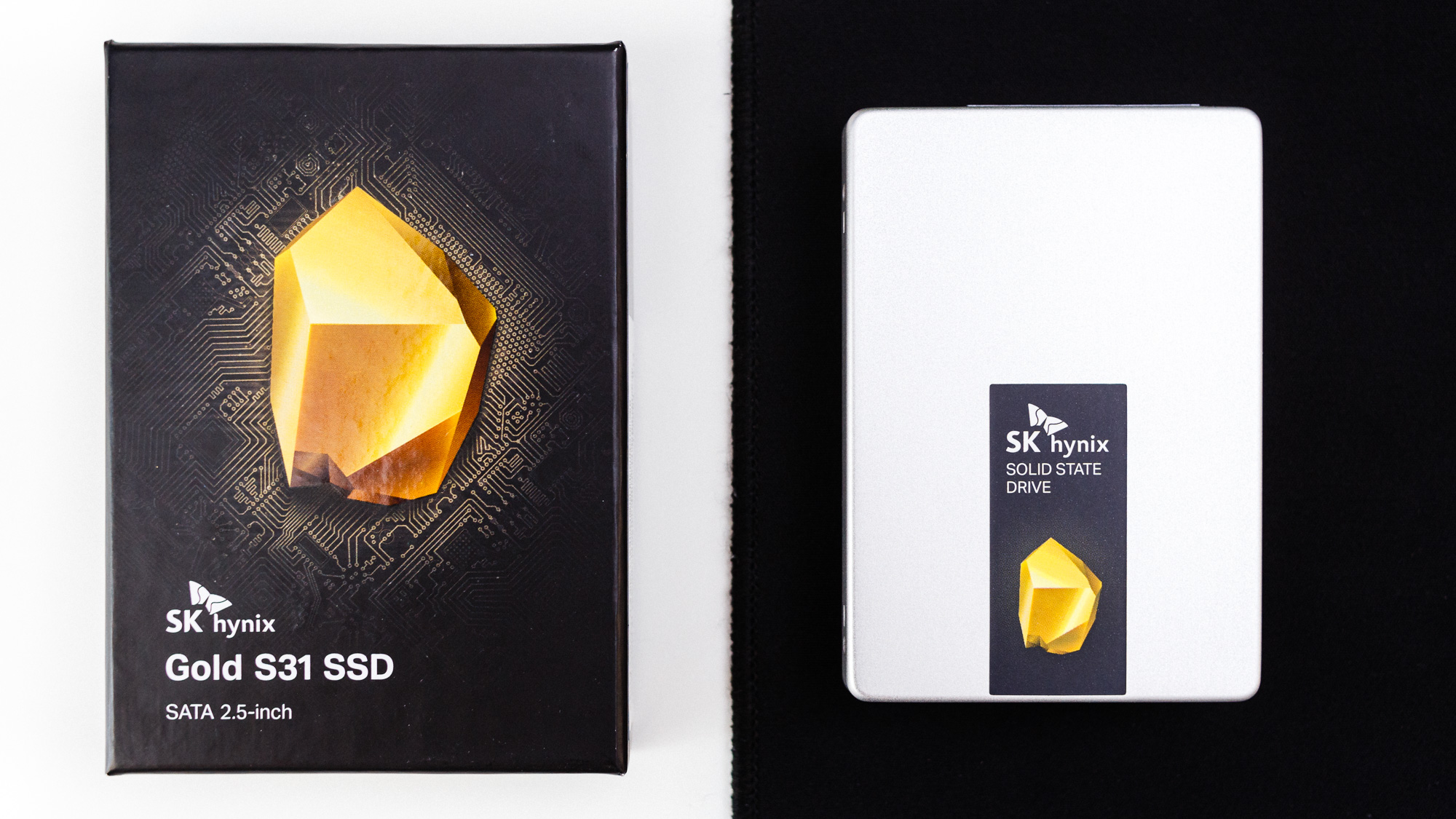
Game Scene Loading - Final Fantasy XIV
The Final Fantasy XIV StormBlood benchmark is a free real-world game benchmark that easily and accurately compares game load times without the inaccuracy of using a stopwatch.
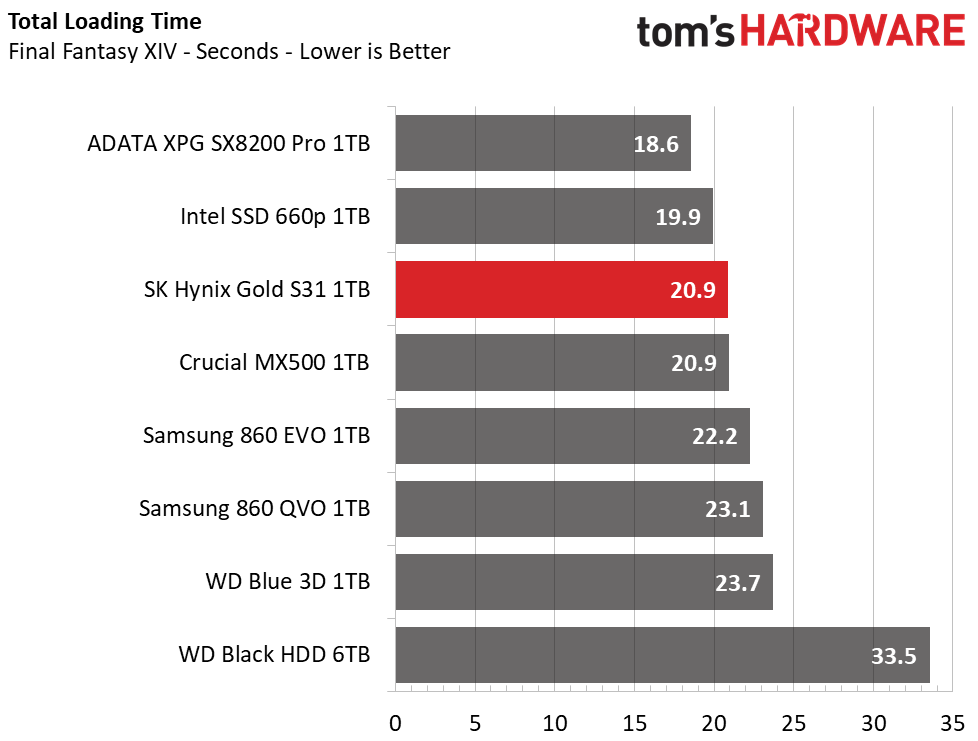
While the SK Hynix Gold S31 is beaten by the two NVMe SSDs, it only lost by a second or two. The Gold S31 is actually one of the fastest SSDs during game scene loading, beating even the Samsung 860 EVO. Compared to an HDD, it cuts off 1/3rd off the load time.
Transfer Rates – DiskBench
We use the DiskBench storage benchmarking tool to test file transfer performance with our own custom 50GB block of data. Our data set includes 31,227 files of various types, like pictures, PDFs, and videos. We copy the files to a new folder and then follow-up with a reading test of a newly written 6.5 GB file.
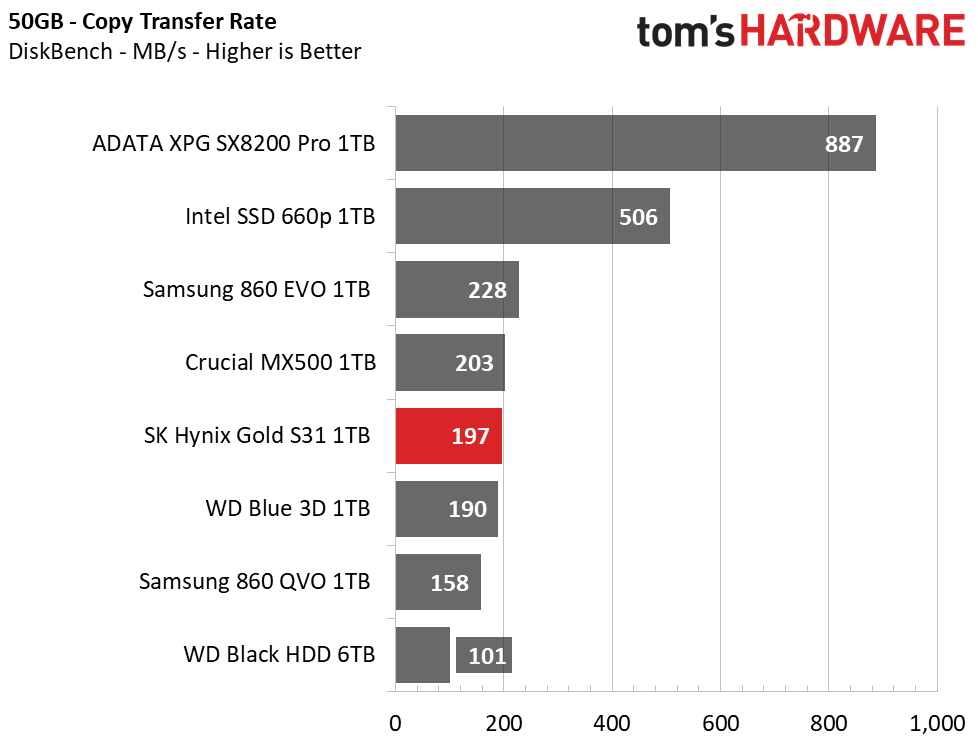
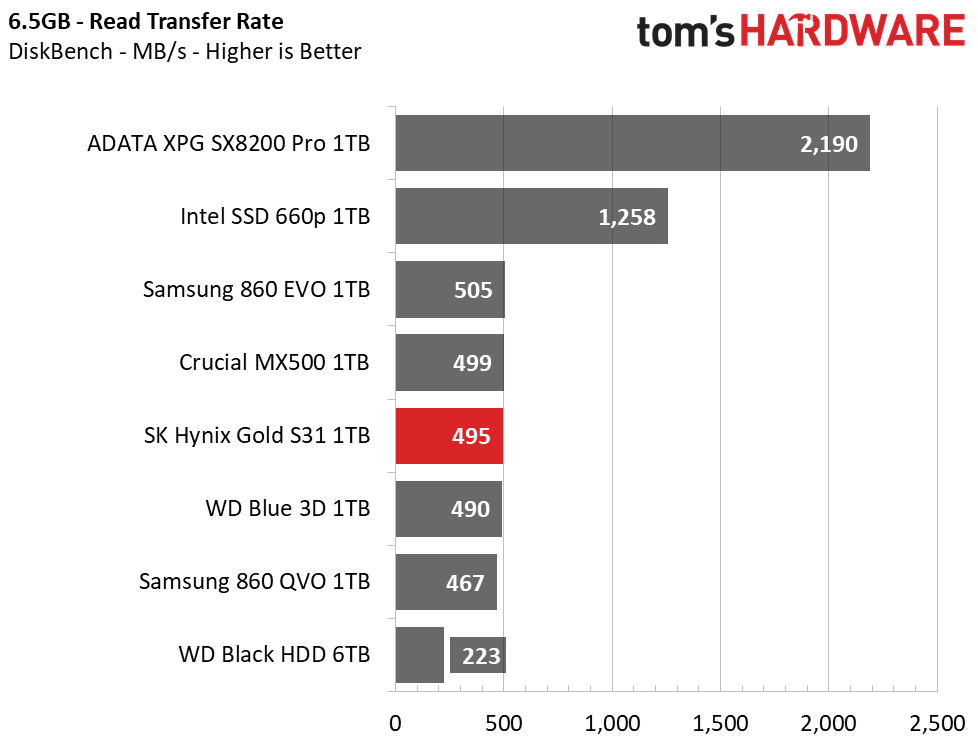
The SK Hynix Gold S31 can copy and read files without a sweat. Samsung’s 860 EVO took the crown as the fastest SATA SSD to copy the 50GB file folder, but the Gold S31 still did well and scored similarly to the MX500.
Trace Testing – PCMark 8 Storage Test 2.0
PCMark 8 is a trace-based benchmark that uses Microsoft Office, Adobe Creative Suite, World of Warcraft, and Battlefield 3 to measure the performance of storage devices in real-world scenarios.
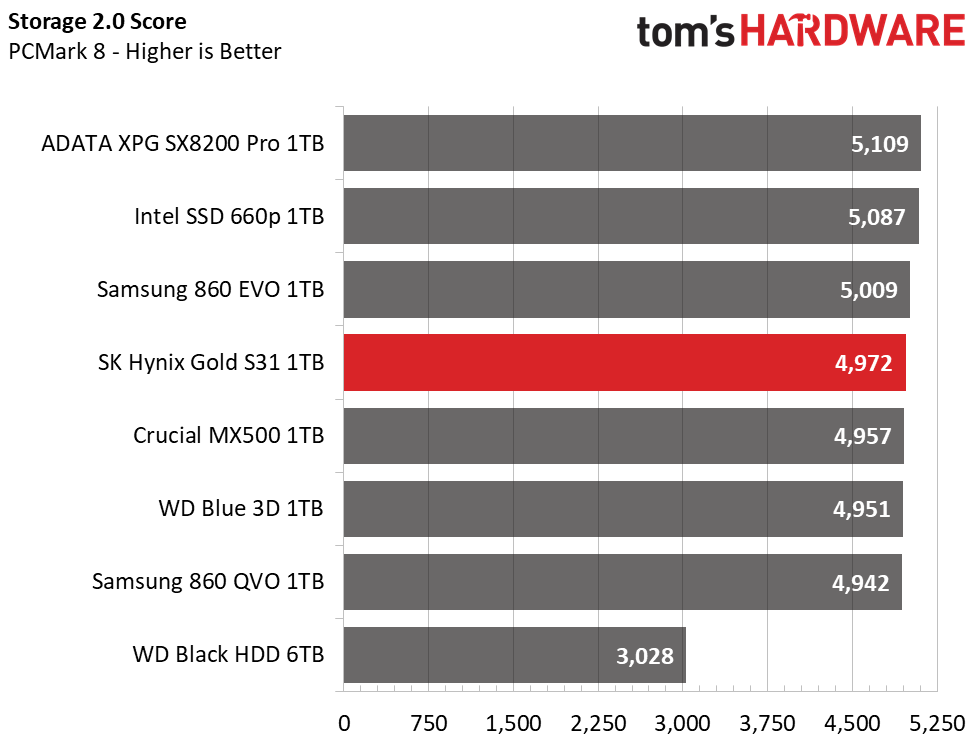
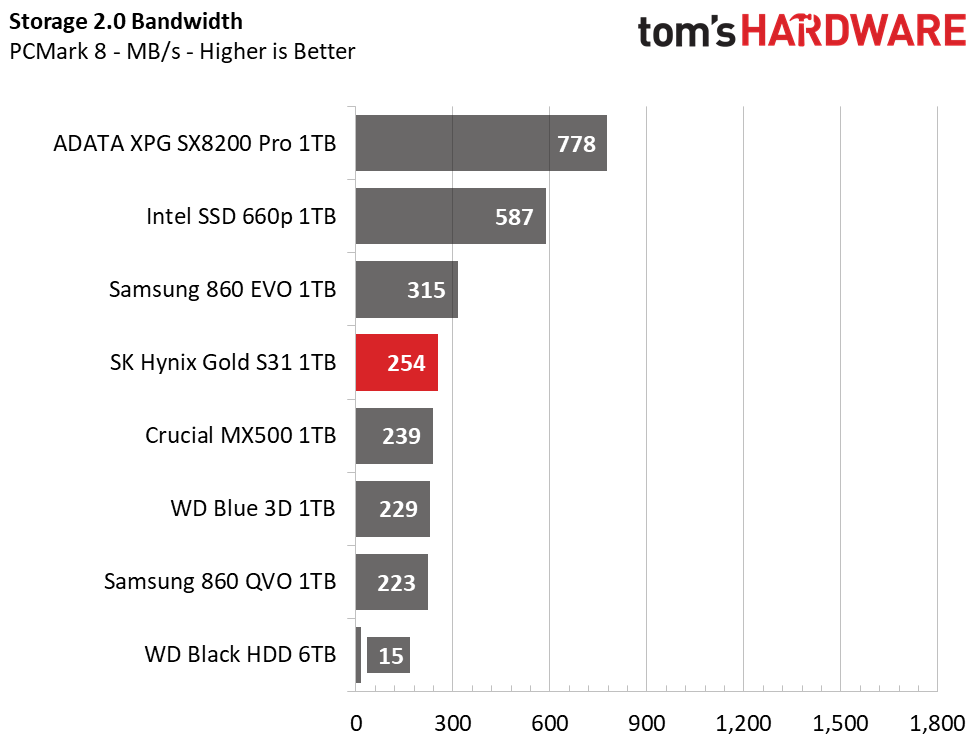
The Gold S31 is just as good as any other mainstream SATA-based SSD. It landed in fourth place overall, making it the second-fastest in our test pool. It also delivered up to 16 times more performance than the HDD.
Get Tom's Hardware's best news and in-depth reviews, straight to your inbox.
Trace Testing – SPECworkstation 3
Like PCMark 8, SPECworkstation 3 is a trace-based benchmark, but it is designed to push the system harder by measuring workstation performance in professional applications.
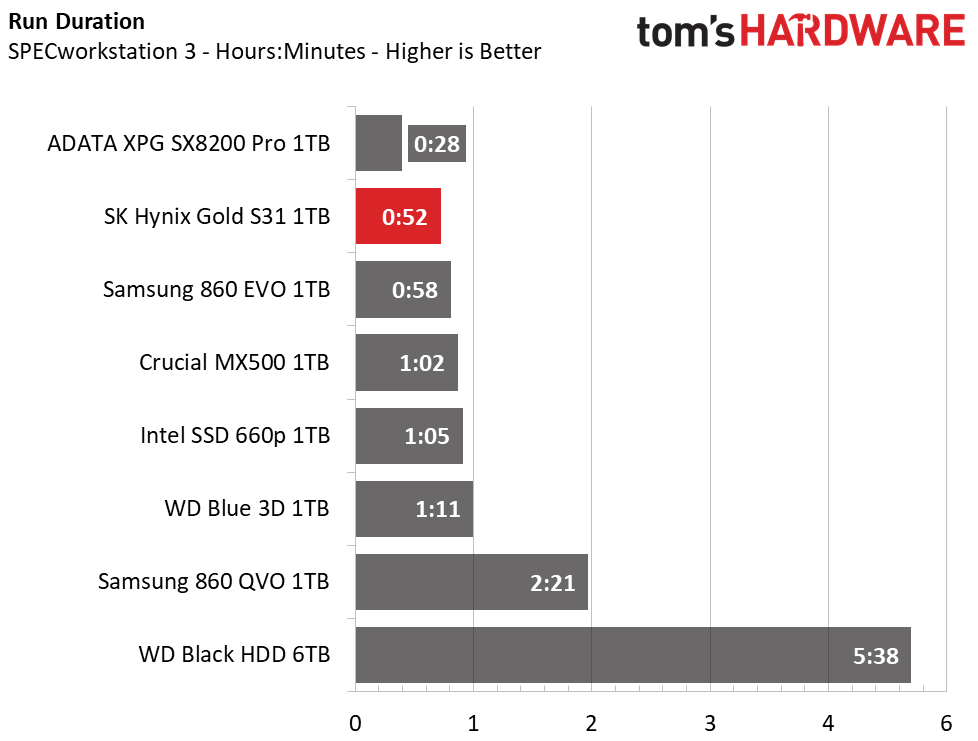
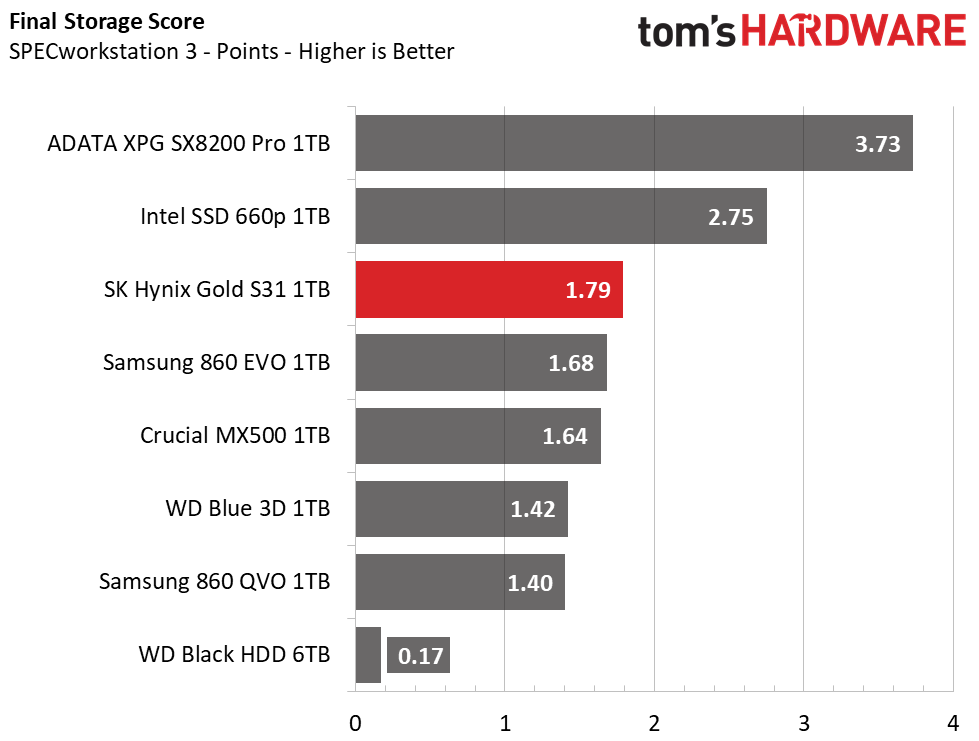
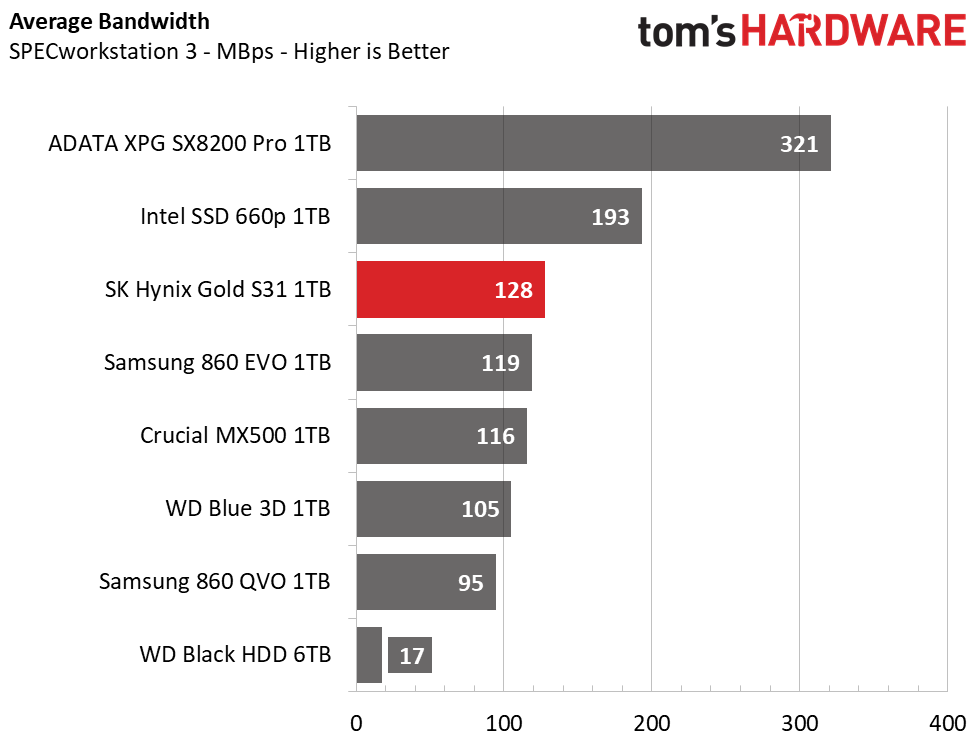
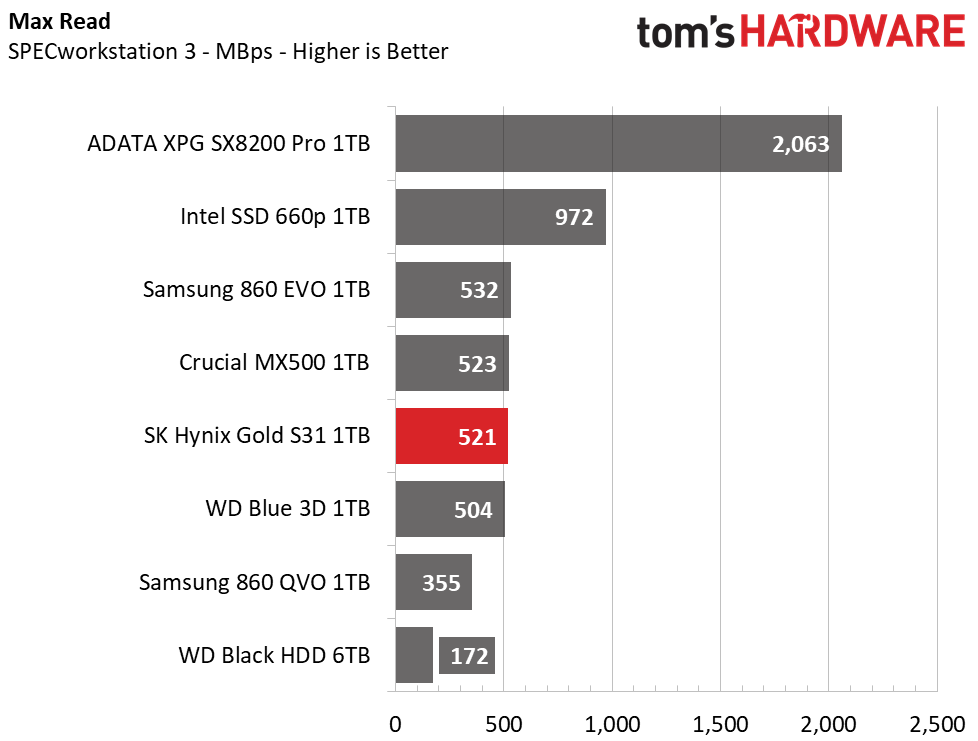
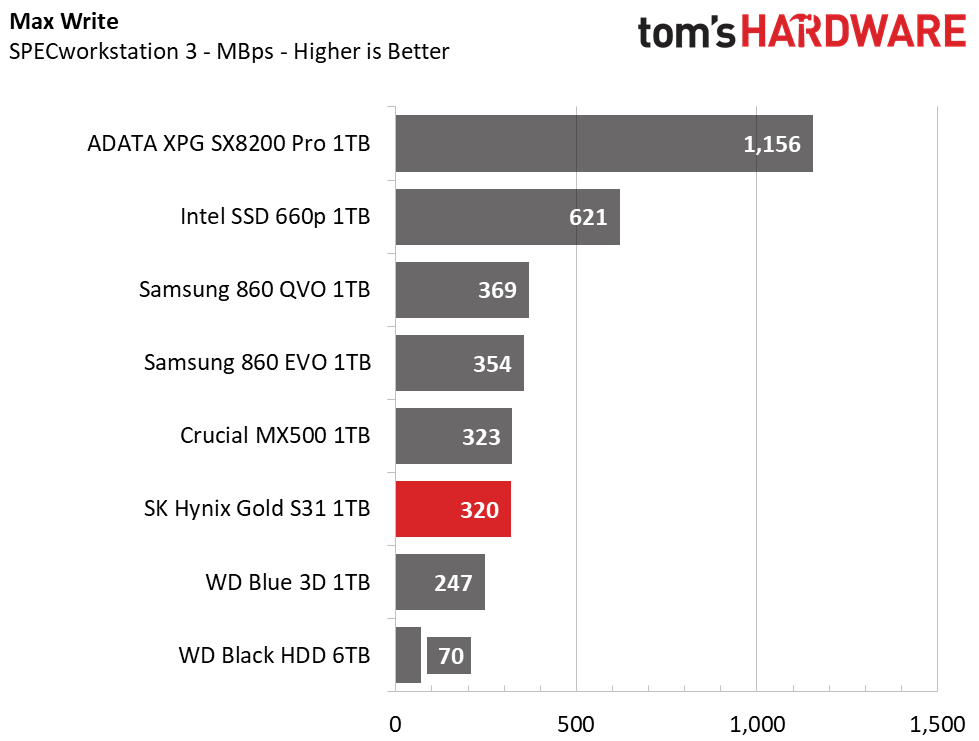
While not the best option for your workstation, the Gold S31 still did a great job while handling I/O heavy applications. Compared to the Adata drive, it took twice as long to complete the test, but landed in second place in time to completion, and third place overall. Again, it outscored the 860 EVO and MX500.
Synthetics - ATTO
ATTO is a simple and free application that SSD vendors commonly use to assign sequential performance specifications to their products. It also gives us insight into how the device handles different file sizes.
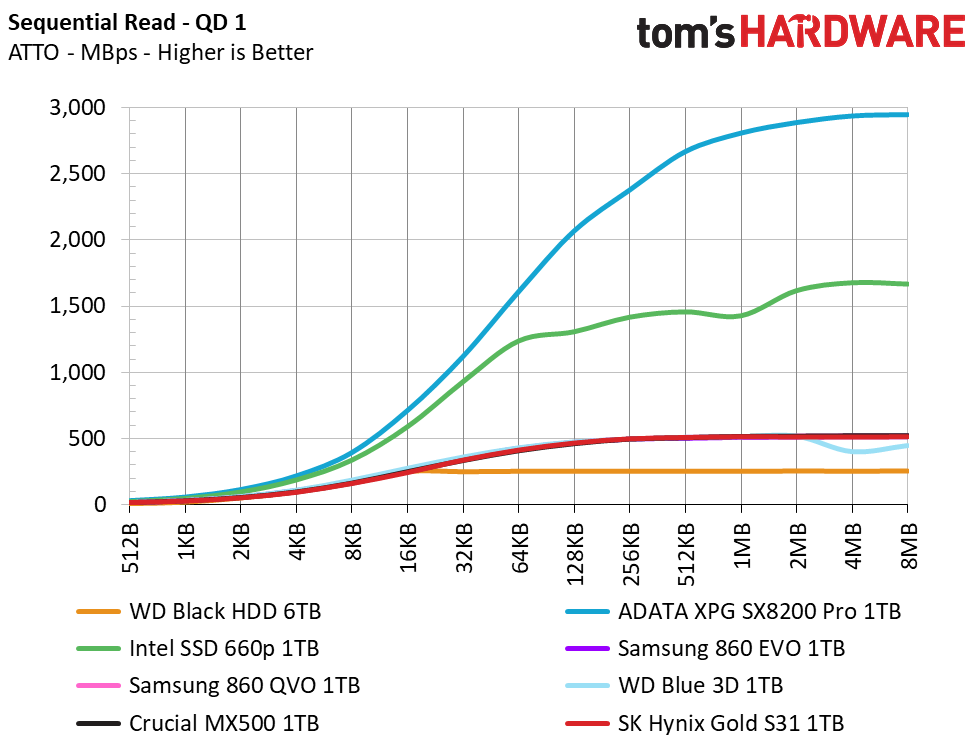
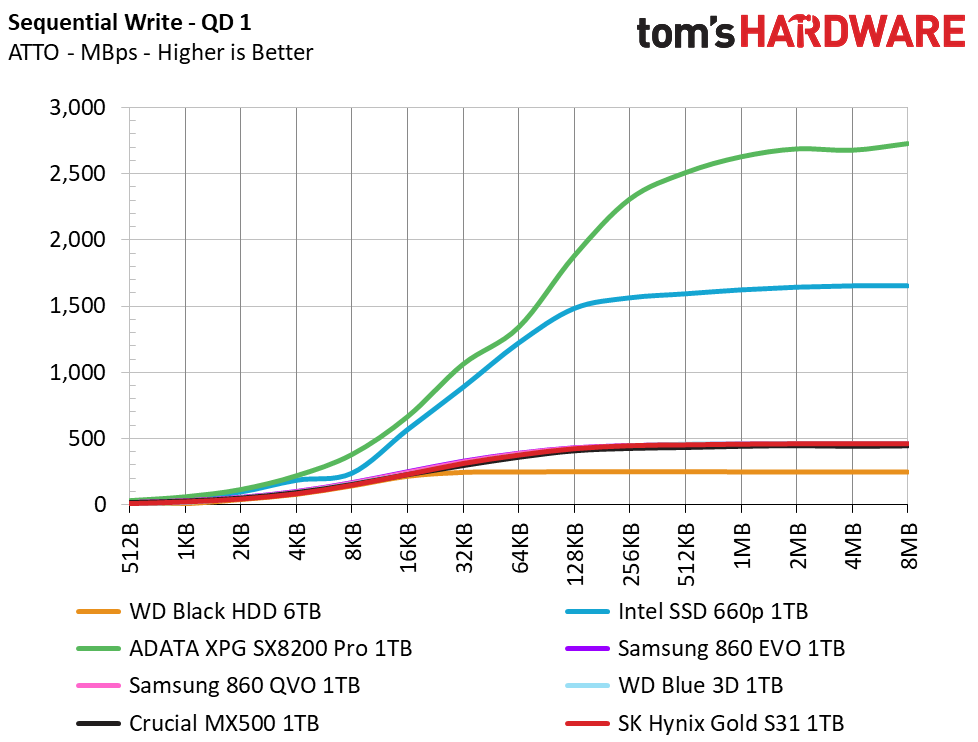
We tested the Gold S31 in file access tests with various block sizes. It performed similarly to most SATA SSDs, but was easily outperformed by the PCIe NVMe competition across the board.
Synthetic Testing - iometer
iometer is an advanced and highly configurable storage benchmarking tool that vendors often use to measure the performance of their devices.
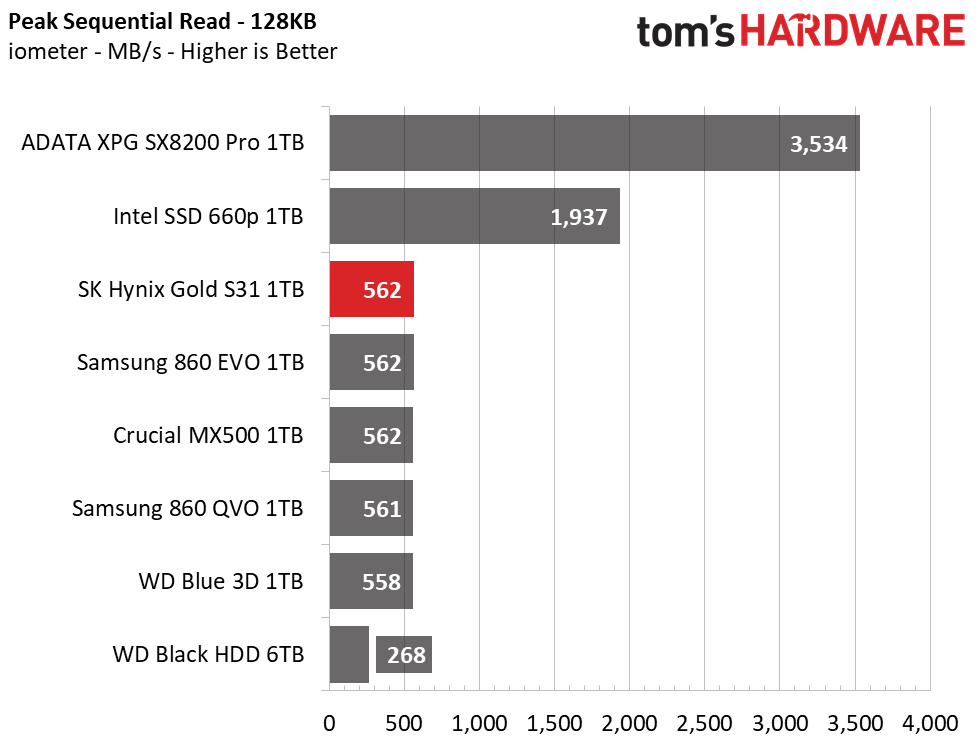
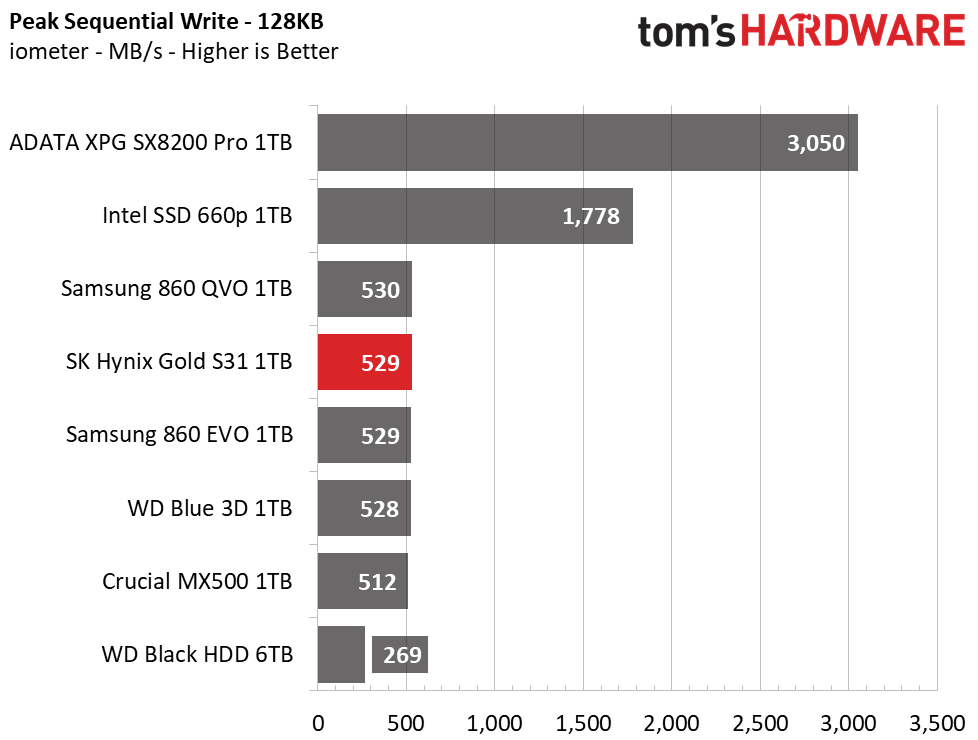
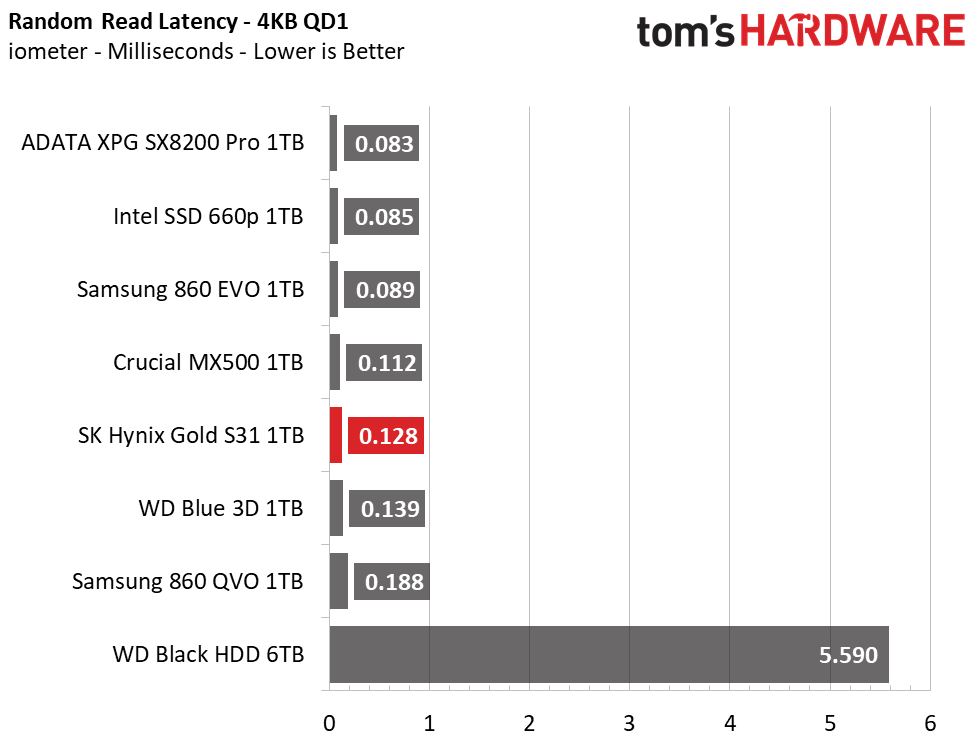
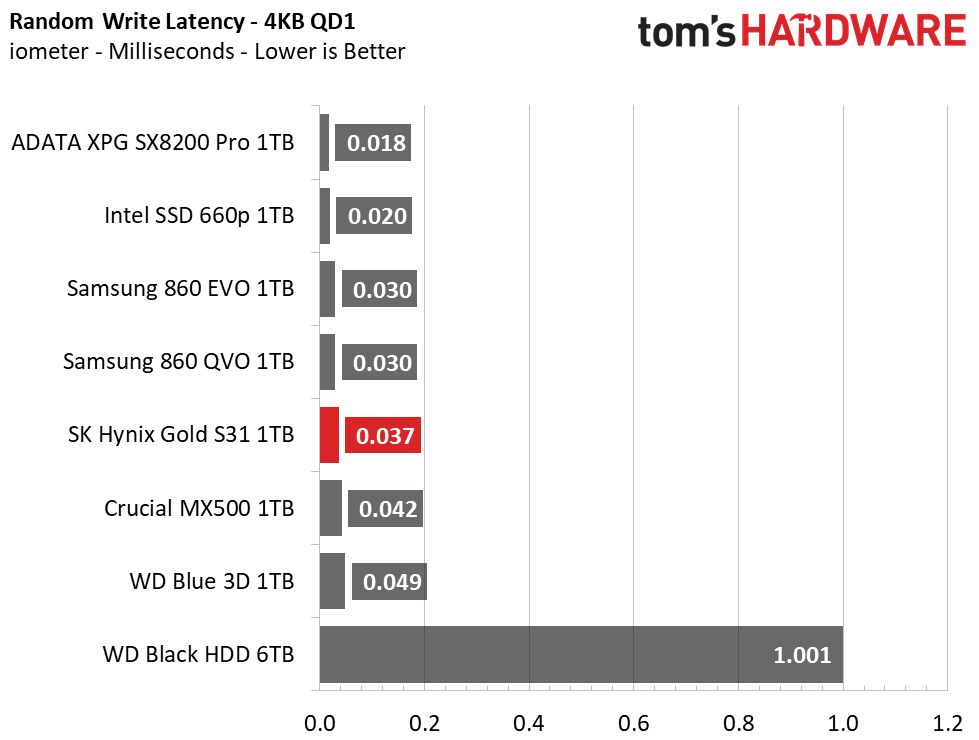
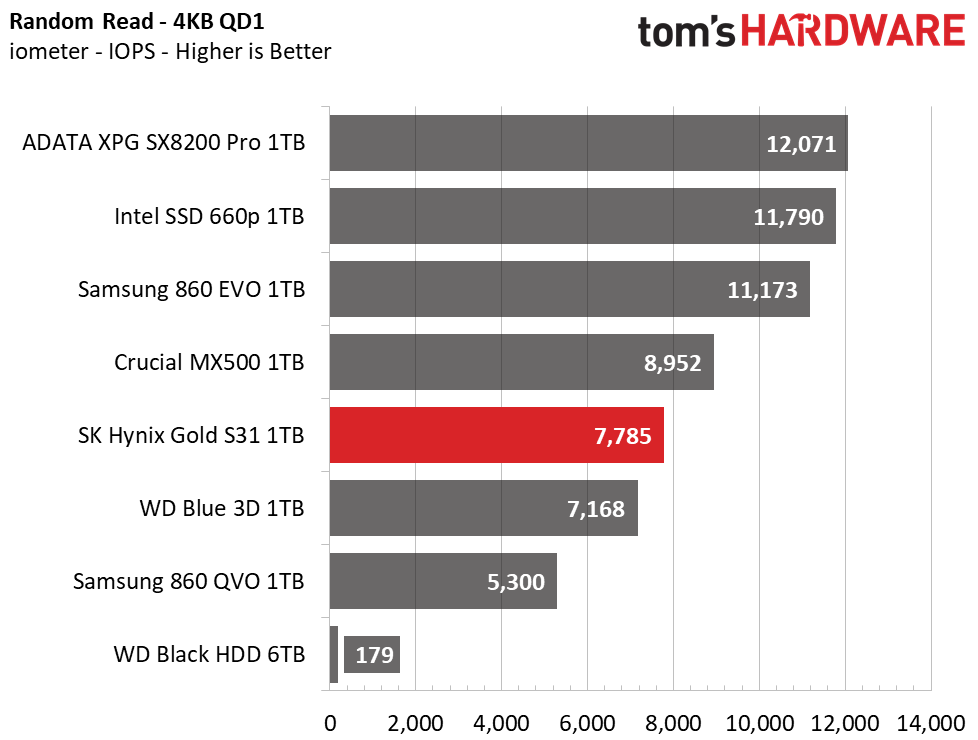
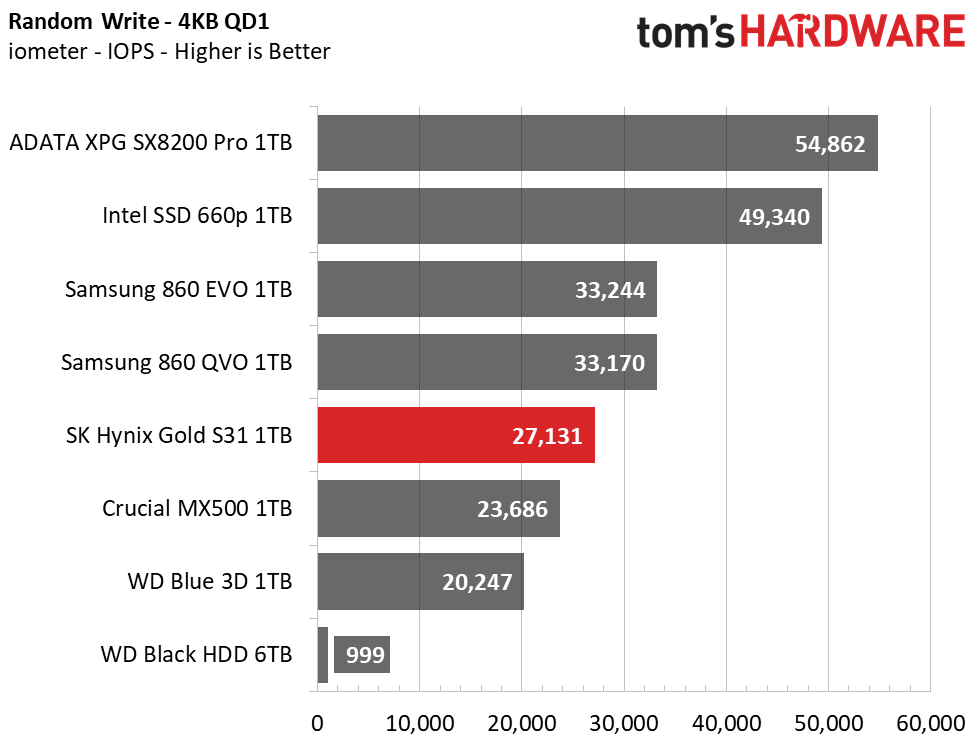
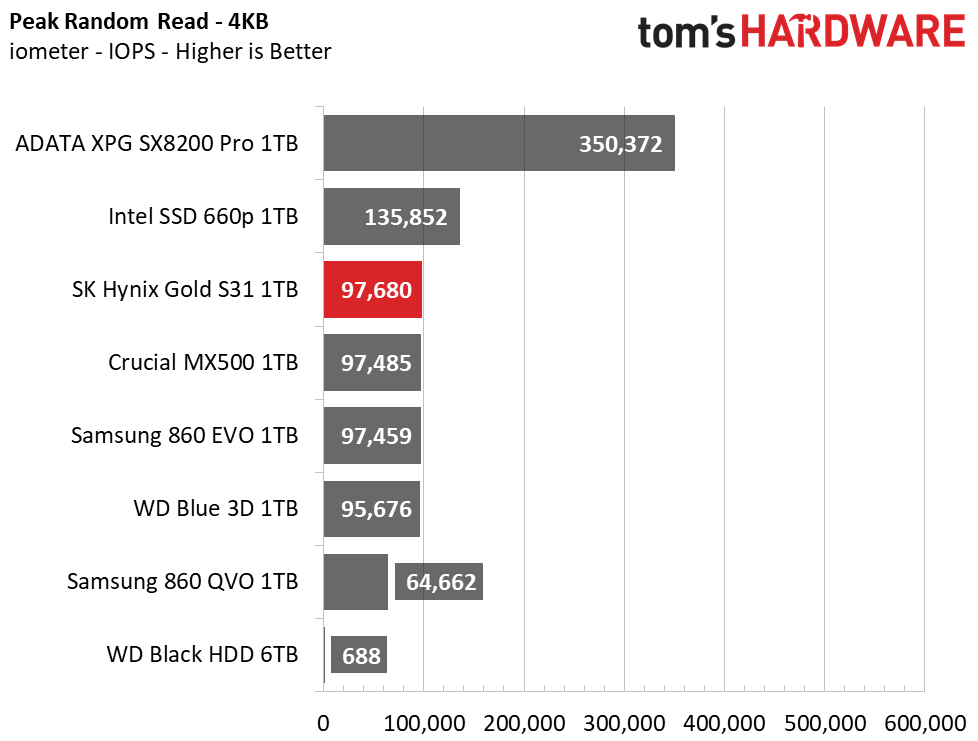
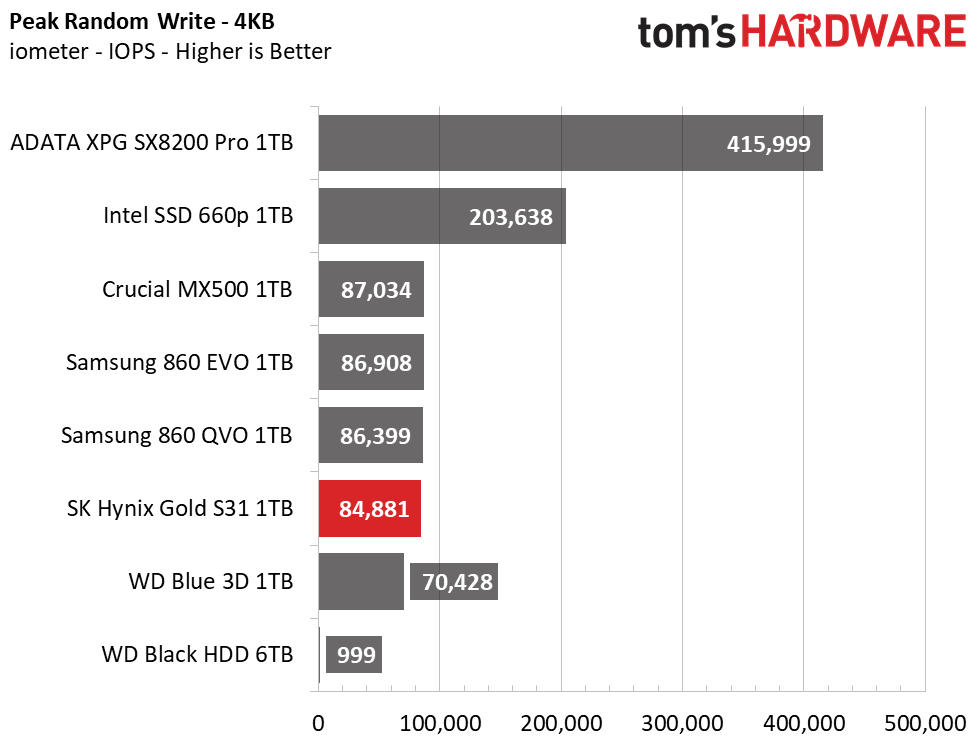
Peak sequential throughput clocks in at 562/529 MBps, which is a great result for a SATA SSD. Random performance is similar to most other SATA drives.
Sustained Write Performance, Cache Recovery, and Temperature
Official write specifications are only part of the performance picture. Most SSD makers implement a write cache, which is a fast area of (usually) pseudo-SLC programmed flash that absorbs incoming data. Sustained write speeds can suffer tremendously once the workload spills outside of the cache and into the "native" TLC or QLC flash. We use iometer to hammer the SSD with sequential writes for 15 minutes to measure both the size of the write cache and performance after the cache is saturated. We also monitor cache recovery via multiple idle rounds.
When possible, we also log the temperature of the drive via the S.M.A.R.T. data to see when (or if) thermal throttling kicks in and how it impacts performance. Bear in mind that results will vary based on the workload and ambient air temperature.
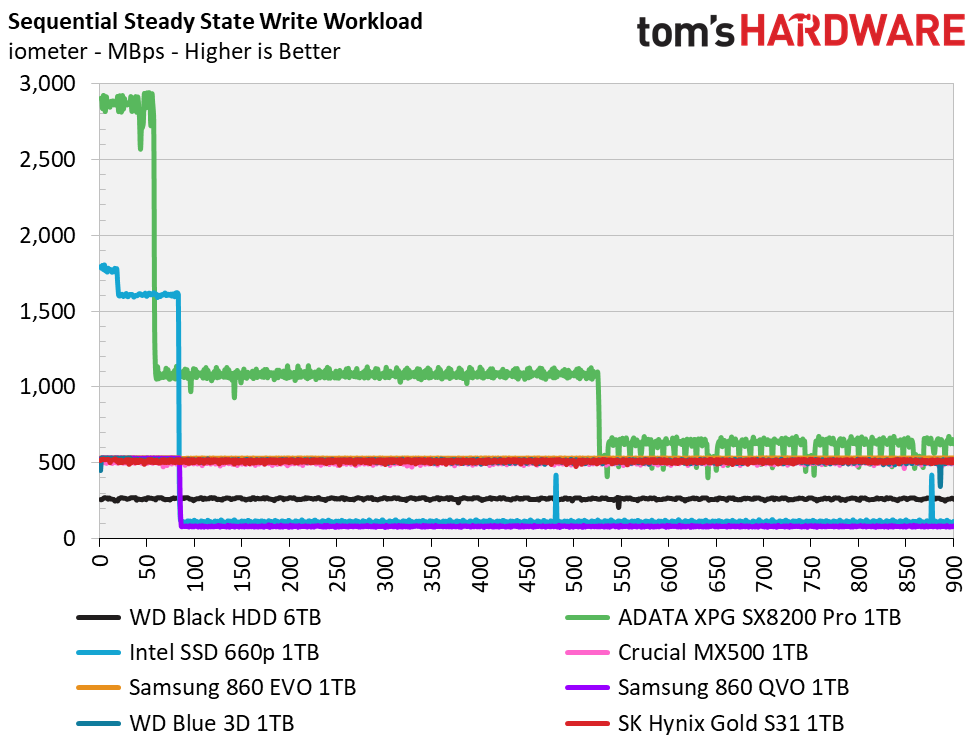
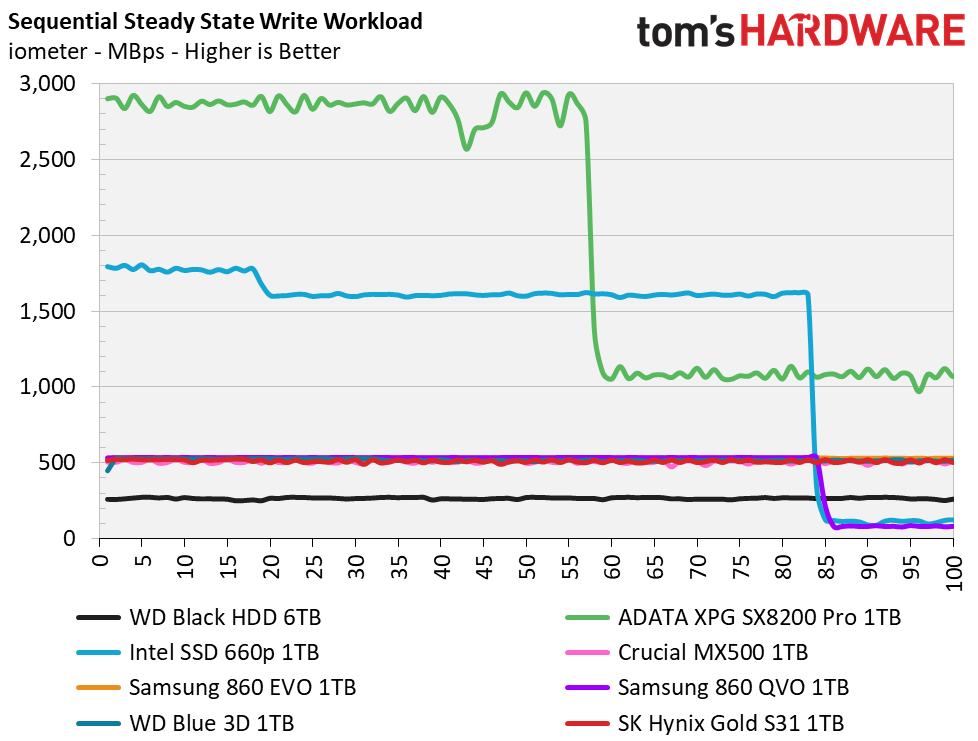
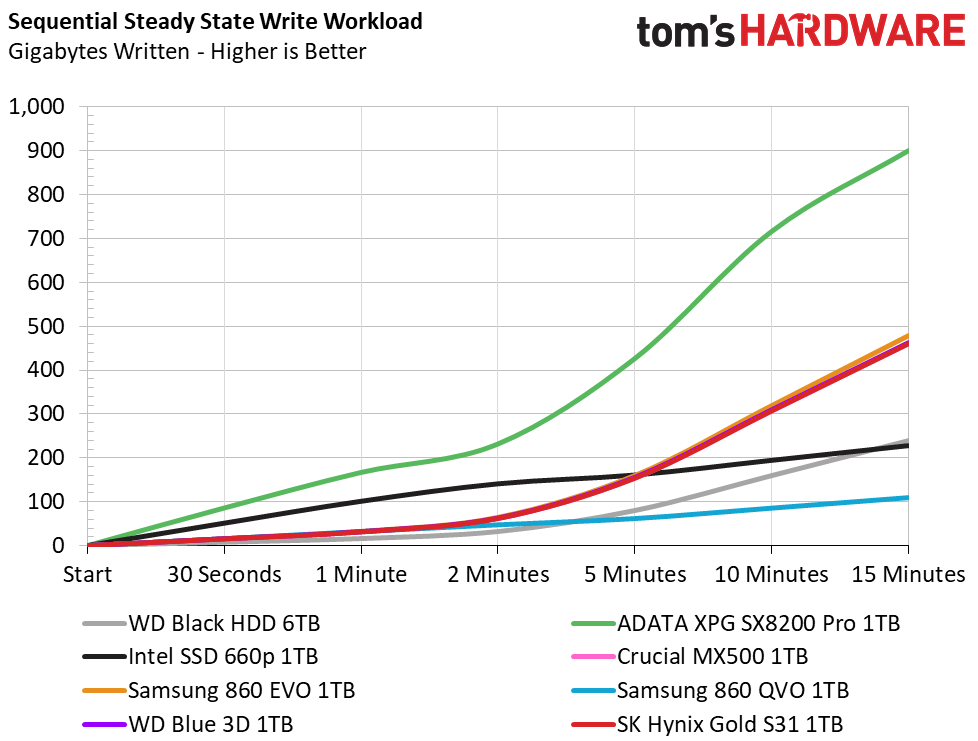
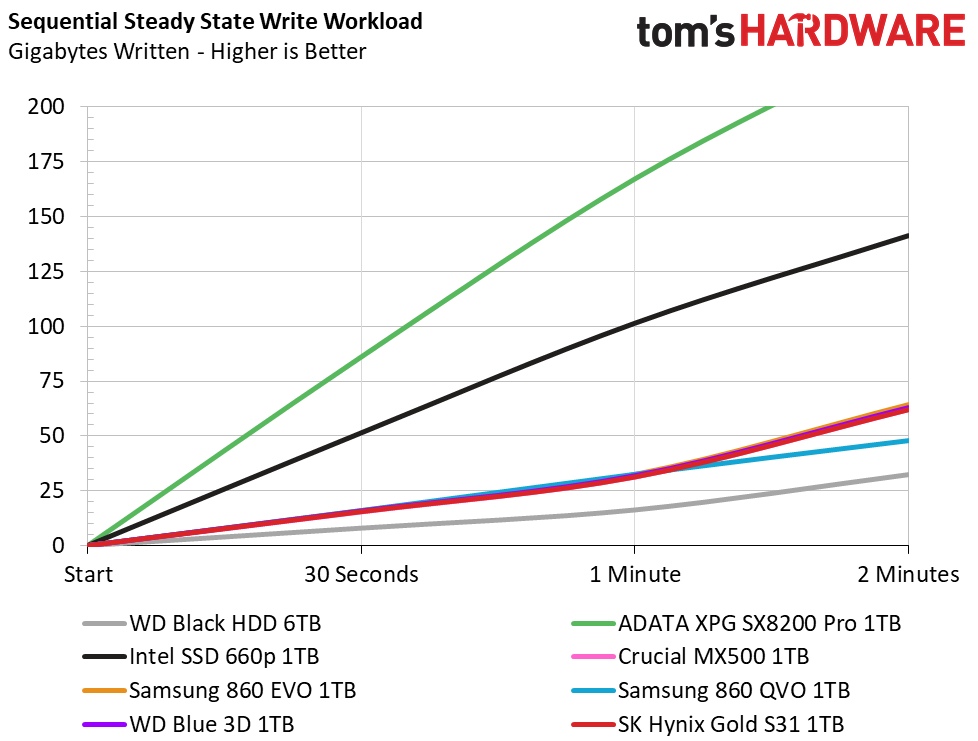
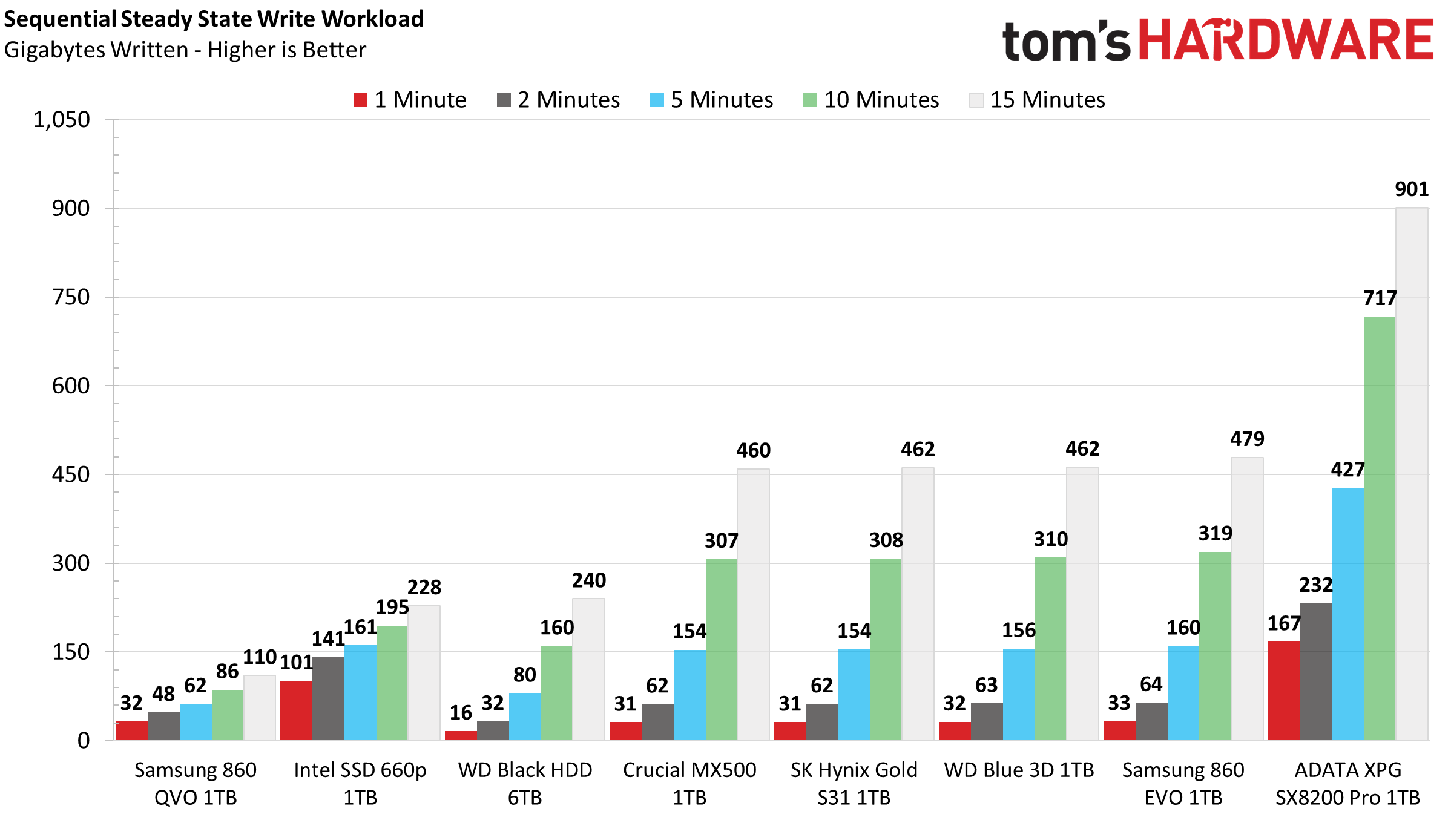
The SK Hynix Gold S31 features a small 12GB cache that recovers within 30-seconds. We noted a write rate of about 522 MBps until it degraded. After degradation, throughput averaged 471 MBps. This result isn’t too shabby for our 1TB model, but smaller capacities will degrade to a slower data rate. The controller didn’t overheat because the case does a great job of transferring heat out of the controller.
Power Consumption
We use the Quarch HD Programmable Power Module to gain a deeper understanding of power characteristics. Idle power consumption is a very important aspect to consider, especially if you're looking for a new drive for your laptop. Some SSDs can consume watts of power at idle while better-suited ones sip just milliwatts. Average workload power consumption and max consumption are two other aspects of power consumption, but performance-per-watt is more important. A drive might consume more power during any given workload, but accomplishing a task faster allows the drive to drop into an idle state faster, which ultimately saves power.
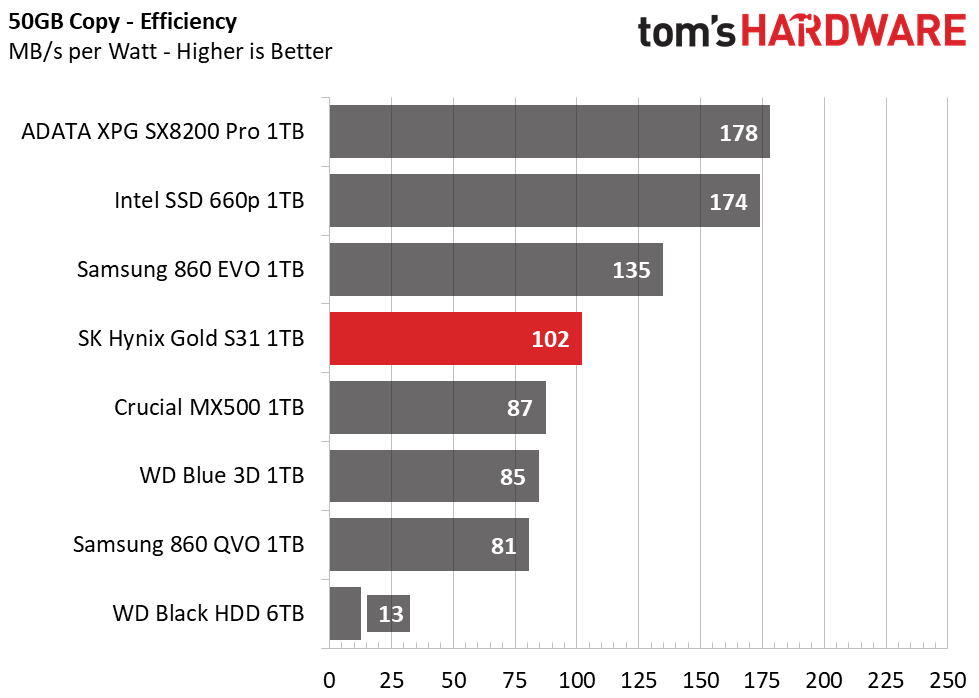
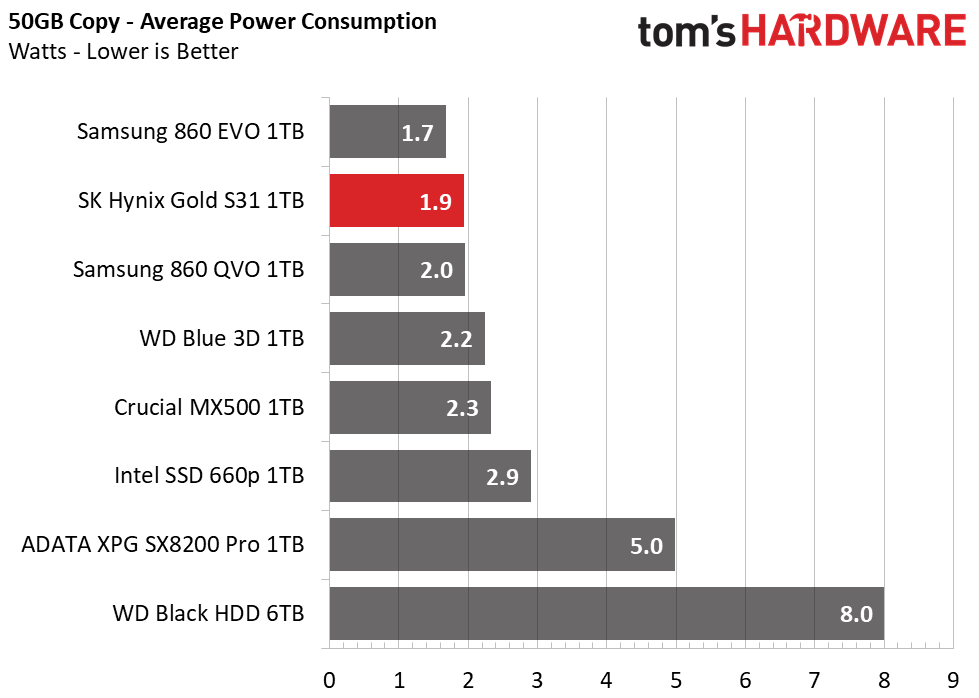
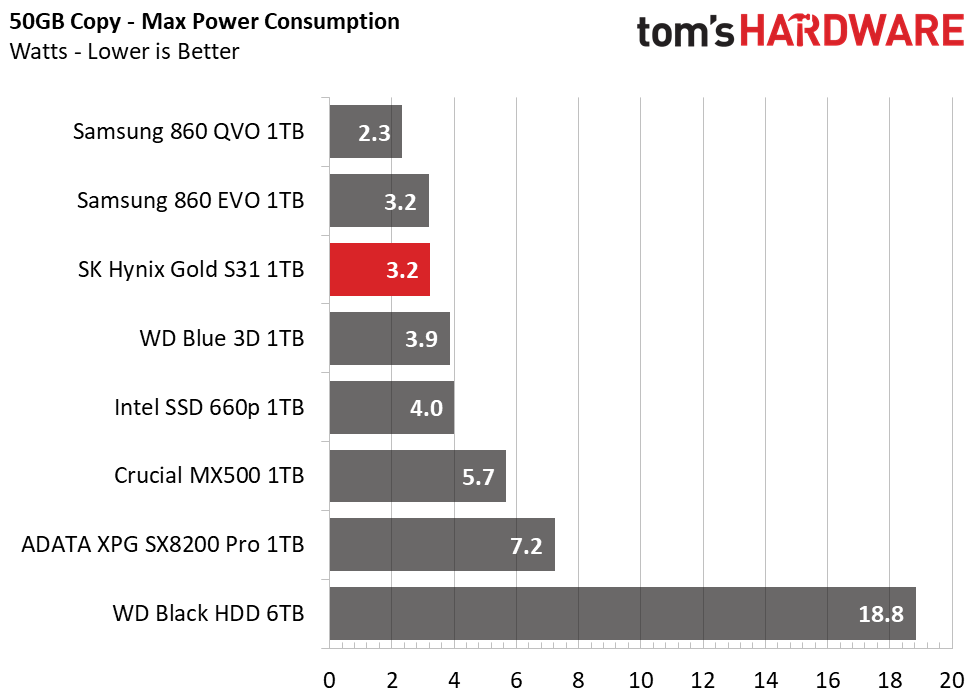
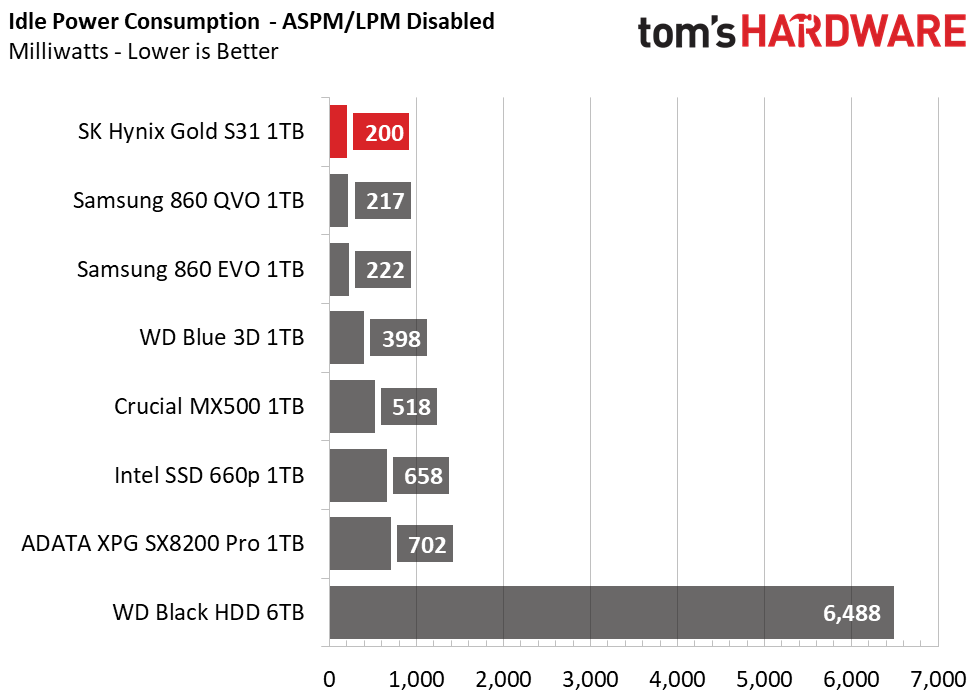
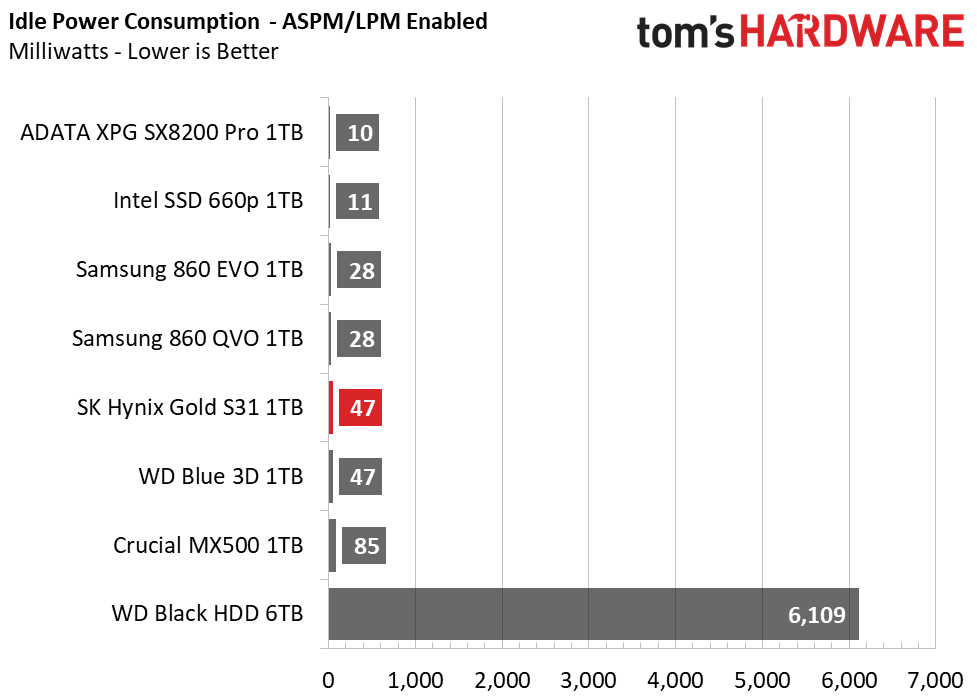
The Gold S31 scored fourth overall in our efficiency metric. On average, it consumed less than 2W during out file copy test and peaked at just 3.2W. It also consumed very little power at idle: The drive consumed the least amount of power in the group with LPM disabled, and matched the WD Blue 3D when we enabled the feature.
MORE: Best SSDs
MORE: How We Test HDDs And SSDs
MORE: All SSD Content

Sean is a Contributing Editor at Tom’s Hardware US, covering storage hardware.
-
mdd1963 Impressive results...Reply
(I rarely use a SATA SSD larger than 500 GB or 1 TB anyway)
However, with pricing roughly equal to Crucial's MX500, I'm not sure I'm willing to make the leap without someone else first taking the risk on reliability/endurance testing, etc...
Given a need for a SATA drive, when someone else is paying, I'll take Samsung's 860 EVO
When I am paying , it's Crucial MX500... :)
Given a year's worth of history of lots of samples tested with few to no failures noted, I'll gladly try this Hynix unit, but, they will have to undercut Crucial by more than $3 or so.... Given equal pricing (which seems to be the case based on 1 TB unit current prices), I'd stick with Crucial at this point.... -
computerprogrammer2028 Currently I have a WD VelociRaptor 500 GB Workstation Hard drive: 3.5 inch/10000 RPM. The speed of which was blazing for a HDD. But is aging since I got it back in 2013 (7 years ago). So I decided to take a dive into the world of SSD's. I ran across the SK Hynix Gold and was impressed with the price for a 500GB SSD and the speed. I'm not so much concerned about reliability since I'm keep my old Raptor HDD and use it to backup the SSD. But with the review + a 5 year warranty, how can you lose here? The price is competitive as well with provided friendly migration tools. I'll miss using my Raptor, but no more noisy HDD mechanical drive, and welcome to the world of quiet and fast HDD's. One day I'll replace my Raptor HDD backup probably with a 1TB WS Blue drive(7200RPM) to take over backup chores, but at least it won't be due to a failed drive and lost data.Reply -
thgmds I bought the SK hynix s31 500gb for my mac mini late 2012.Reply
Like any enthusiast running some tests I realized that DriveDx is showing me a note that I don't know what it is, the SMART test does not present any problem.
Issue on driveDX:
ID | NAME | TYPE | UPDATE | RAW VALUE | VALUE | THRESHOLD | WORST | LAST MODIFIED | STATUS
204 Soft ECC Correction Life-span online 8.035 1 0 1 - 1.0% Warning
This is a problem, should I call the guarantee?
Thanks,
Above have all log from DriveDx after 3 days of use.
### SYSTEM INFORMATION ###
Report Timestamp : 20 de outubro de 2020 14:00:15 BRT
Report Timestamp (ISO 8601 format) : 2020-10-20T14:00:15
Application Name : DriveDx
Application Version : 1.9.1.670
Application SubBuild : 0
Application Edition : Standalone
Application Website : https://binaryfruit.com/drivedxDriveDx Knowledge Base Revision : 11/11
Computer Name : Mac mini
Host Name : Mac-mini
Computer Model : Macmini6,2
OS Boot Time : 2020-10-20T13:41:18
Time Since Boot : 00h 18m 57s
OS Name : macOS
OS Version : 10.15.7
OS Build : 19H2
OS Kernel Version : Darwin 19.6.0
SAT SMART Driver Version : N/A
ATA Command Support Tolerance : verypermissive
N of drives with S.M.A.R.T support : 1
### DRIVE 1 OF 1 ###
Last Checked : 20 de outubro de 2020 13:59:14 BRT
Last Checked (ISO 8601 format) : 2020-10-20T13:59:14
Advanced SMART Status : OK
Overall Health Rating : GOOD 97.6%
Overall Performance Rating : BAD 1.0%
SSD Lifetime Left Indicator : GOOD 100%
Issues found : 1
Serial Number : EN***WWN Id :
Volumes : Machintosh
Device Path : /dev/disk0
Total Capacity : 500.1 GB (500.107.862.016 Bytes)
Model : SHGS31-500GS-2
Form Factor : 2.5 inches
Firmware Version : 90000Q00
Drive Type : SSD
Power On Time : 8 hours (8 hours)
Power Cycles Count : 13
Current Power Cycle Time : 0.3 hours
=== DEVICE CAPABILITIES ===
S.M.A.R.T. support enabled : yes
DriveDx Active Diagnostic Config : Default SSD config Sector Logical Size : 512
Sector Physical Size : 4096
Physical Interconnect : SATA
Logical Protocol : SATA
Removable : no
Ejectable : no
ATA Version : ACS-3 (minor revision not indicated)
SATA Version : SATA 3.2, 6.0 Gb/s (current: 6.0 Gb/s)
Bay # : 2
I/O Path : IOService:/AppleACPIPlatformExpert/PCI0@0/AppleACPIPCI/SATA@1F,2/AppleIntelPchSeriesAHCI/PRT1@1/IOAHCIDevice@0/AppleAHCIDiskDriver/IOAHCIBlockStorageDevice
Attributes Data Structure Revision : 0
SMART Command Transport (SCT) flags : 0x0
SCT Status supported : no
SCT Feature Control supported : no
SCT Data Table supported : no
Error logging capabilities : 0x1
Self-tests supported : yes
Offline Data Collection capabilities : 0x51
Offline Data Collection status : 0x2
Auto Offline Data Collection flags : 0x0
: no
: 0xc0000020
: 2020-10-20T13:59:14
: 0x40000020
: 0x1
Last Email Report Timestamp : 2020-10-20T13:59:14
Last Email Report Reason Flags : 0x40000020
Last Email Report State Change Flags : 0x1
=== CURRENT POWER CYCLE STATISTICS ===
Data Read : 1.5 GB
Data Written : 2.9 GB
Data Read/Write Ratio : 0.51
Average Throughput (Read) : 39.9 MB/s
Average Throughput (Write) : 186.4 MB/s
Operations (Read) : 59.437
Operations (Write) : 74.678
Operations Read/Write Ratio : 1
Throughput per operation (Read) : 26.6 KB/Op
Throughput per operation (Write) : 41.2 KB/Op
Latency Time (Read) : 0 ns
Latency Time (Write) : 0 ns
Retries (Read) : 0
Retries (Write) : 0
Errors (Read) : 0
Errors (Write) : 0
=== PROBLEMS SUMMARY ===
Failed Indicators (life-span / pre-fail) : 0 (0 / 0)
Failing Indicators (life-span / pre-fail) : 0 (0 / 0)
Warnings (life-span / pre-fail) : 1 (1 / 0)
Recently failed Self-tests (Short / Full) : 0 (0 / 0)
I/O Error Count : 0 (0 / 0)
Time in Under temperature : 420 minutes
Time in Over temperature : 0 minutes
=== IMPORTANT HEALTH INDICATORS ===
ID NAME RAW VALUE STATUS
5 Retired Block Count 0 100% OK
177 Wear Leveling Count 1 100% OK
179 Used Reserved Block Count Total 0 100% OK
180 Unused Reserved Block Count Total 891 100% OK
233 Media Wearout Indicator 0x64 100% OK
241 Total LBAs Written 198 (99.0 KB) 100% OK
=== TEMPERATURE INFORMATION (CELSIUS) ===
Current Temperature : 42
Power Cycle Min Temperature : 37
Power Cycle Max Temperature : 42
Lifetime Min Temperature : 25
Lifetime Max Temperature : 54
Recommended Min Temperature : -20
Recommended Max Temperature : 80
Temperature Min Limit : -20
Temperature Max Limit : 80
=== DRIVE HEALTH INDICATORS ===
ID | NAME | TYPE | UPDATE | RAW VALUE | VALUE | THRESHOLD | WORST | LAST MODIFIED | STATUS
1 Raw Read Error Rate Life-span online 0x0 166 6 166 - 97.6% OK
5 Retired Block Count Life-span online 0 100 36 100 - 100% OK
9 Power On Hours Life-span online 8 100 0 100 - 100% OK
12 Power Cycle Count Life-span online 13 100 20 100 - 100% OK
100 Vendor Specific Life-span online 0x35AE 100 0 100 - 100% OK
168 Vendor Specific Life-span online 0x1 100 0 100 - 100% OK
169 Vendor Specific Life-span online 0x2 100 0 100 - 100% OK
171 Program Fail Count Total Life-span online 0 100 0 100 - 100% OK
172 Erase Fail Count Total Life-span online 0 100 0 100 - 100% OK
174 Unexpected Power Loss Count Life-span online 5 100 0 100 - 100% OK
175 Program Fail Count Chip Life-span online 0 100 0 100 - 100% OK
176 Erase Fail Count Chip Life-span online 0 100 0 100 - 100% OK
177 Wear Leveling Count Life-span online 1 100 0 100 - 100% OK
178 Used Reserved Block Count Chip Life-span online 0 100 0 100 - 100% OK
179 Used Reserved Block Count Total Life-span online 0 100 0 100 - 100% OK
180 Unused Reserved Block Count Total Life-span online 891 100 0 100 - 100% OK
184 End-to-End Error Life-span online 0 100 0 100 - 100% OK
187 Flash Read Fail Count Life-span online 0 100 0 100 - 100% OK
188 Command Timeout Life-span online 0 100 0 100 - 100% OK
194 Temperature (Celsius) Life-span online 42 58 30 46 - 40.0% OK
195 Hardware ECC Recovered Life-span online 0x0 100 0 100 - 100% OK
196 Reallocated Event Count Life-span online 0 100 36 100 - 100% OK
198 Offline Uncorrectable Block Count Life-span offline 0 100 0 100 - 100% OK
199 UDMA CRC Error Count Life-span online 0 100 0 100 - 100% OK
204 Soft ECC Correction Life-span online 8.035 1 0 1 - 1.0% Warning
212 Vendor Specific Life-span online 0x9C 100 0 100 - 100% OK
233 Media Wearout Indicator Pre-fail online 0x64 100 1 100 - 100% OK
234 Vendor Specific Life-span online 0xC0 100 0 100 - 100% OK
241 Total LBAs Written Life-span online 198 (99.0 KB) 100 0 100 - 100% OK
242 Total LBAs Read Life-span online 177 (88.5 KB) 100 0 100 - 100% OK
=== DRIVE ERROR LOG ===
error log is empty
=== DRIVE SELF-TEST LOG ===
# | LIFETIME (H) | TEST TYPE | PROGRESS | STATUS | LBA of 1st error
1 8 Short offline 100% Completed without error -
=== DEVICE STATISTICS ===
General Statistics (revision 1)
0x08 Lifetime Power-on Resets : 13
0x10 Power-on Hours : 8 hours
0x18 Logical Sectors Written : 387.132.407 (184.6 GB)
0x20 Number of Write Commands : 4.002.025
0x28 Logical Sectors Read : 346.085.957 (165.0 GB)
0x30 Number of Read Commands : 6.889.375
0x38 Date and Time TimeStamp : 28.800.000 ms
General Errors Statistics (revision 1)
0x08 Number of Reported Uncorrectable Errors : 0
0x10 Resets Between Cmd Accept. and Compl. : 0
Temperature Statistics (revision 1)
0x08 Current Temperature : 42 °C
0x20 Highest Temperature : 54 °C
0x28 Lowest Temperature : 25 °C
0x50 Time in Over-Temperature : 0 minutes
0x58 Specified Max Operating Temperature : 80 °C
0x60 Time in Under-Temperature : 420 minutes
0x68 Specified Min Operating Temperature : -20 °C
Transport Statistics (revision 1)
0x08 Number of Hardware Resets : 54
0x18 Number of Interface CRC Errors : 0
Solid State Drive Statistics (revision 1)
0x08 Percentage Used Endurance Indicator : 0 %